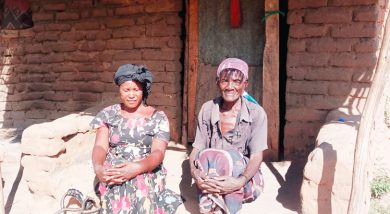Villagers open up on GBV
Rarely do villagers, men, women, the youth and their leaders come together for a candid talk on sexual matters. Culturally, sex is generally reserved for closed-door discussion and not for the public.
But communities in Traditional Authority Kasumbu in Dedza are changing the narrative as they are able to engage in an open and honest conversation to find a solution to gender based violence (GBV).
Last Tuesday, the young and the old gathered at Kasumbu headquarters where the Malawi Human Rights Resource Centre (MHRC), under Power to Youth Programme, organised a community dialogue on how to deal with rising cases of teenage pregnancies and child marriages to find ways of enhancing and male involvement in ending the vices.
The platform allowed communities to truly open up and at one point a blame game ensued between women and men.

“I am a victim of gender-based violence. I am a mother of a child a man disowned. Once I informed him that I was pregnant, he ran away and I never saw him again,” said a young woman who spoke freely at a gathering where not less than 200 people, including district authorities such as police, Judiciary and civil society leaders as well as the media were present.
Lack of child maintenance emerged as one of the common issues in the area. Women speakers claimed that most men were irresponsible and cared less about the home. The police and the magistrate present highlighted legal remedies available for child maintenance.
“All they know is bearing children they cannot support. They will leave you alone to toil in the garden while they are busy drinking alcohol,” said another woman identified as Elizabeth. She spoke with confidence and attracted a loud applause, mostly from women and other officials present.
Another woman interjected claiming that some women do not respect their husbands because “these husbands are irresponsible”.
Men were not keeping quiet after a series of accusations from women who spoke one after another. From the men’s side the common concern was lack of respect from women because of the matrilineal marriage system (chikamwini).
“I am a living example. I have been abused for living at my wife’s place. You do everything for the family only to be chased away that this is not your home,” retorted a male speaker. He publicly confessed that he is an alcoholic because of marital problems. He, too, attracted a loud applause and motivated other men to speak.
Another speaker identified as Alfred Kunyenche said that chikamwini turns men into slaves as they have to work for the wife’s family to prove their worth or “show appreciation to the family for giving you a wife and space”.
Child pregnancy and marriage was another hot topic with group village head Katsekera saying he metes out tough penalties to parents who allow their children to get married. He said such families are asked to pay a goat and this is a deterrent.
Teresa Matiki openly argued against the chief’s position, saying the ‘goat’ punishment only enriches traditional leaders, but changes nothing.
“We keep witnessing child marriages. This simply tells you that paying a goat to the chief does not change anything. It benefits the chief more than the community. It must begin with us parents to engage our children in an honest talk. Some of us have girls who have boyfriends we happily call apongozi and this is what is aggravating child marriages and defilement,” she argued.
Malawi Broadcasting Corporation journalist Emmanuel Thuwala moderated the discussion which will also be aired on MBC TV.
He did so expertly allowing both genders to speak freely, but with guarded emotions. He brought into spotlight authorities such as police, Judiciary and civil society to provide explanations on some sticky issues. So, it was dialogue and awareness wrapped in one basket.
MHRC executive director Emma Kaliya said she was impressed with the level of openness in the discussion, adding that the aim of their project is to promote community dialogue.
“They have solutions to their problems and our role is just to facilitate the dialogue. It was an engaging session with so much to take home with” said Kaliya, a well-known gender justice advocate.
In his remarks, Men Engage Alliance (Malawi) vice-president Marcel Chisi said it is pleasing to note increased male involvement on matters of GBV.
He observed: “Men for a long time have been considered perpetrators, but our approach has been that we engage men as part of the solutions. With interventions like these we have seen an improvement and what has happened today; this interaction is testimony that if we have everyone in the community taking part we can deal with GBV which include child marriages.”





